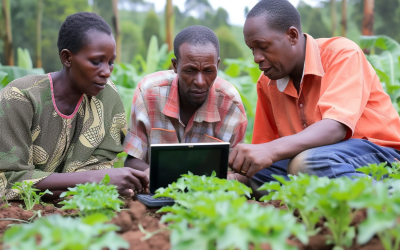African agriculture has long been the backbone of the continent’s economy, employing millions of people and contributing significantly to the GDP of many countries. However, the sector has faced numerous challenges, including limited access to finance, inefficient supply chains, and lack of modern technology. The emergence of fintech applications in African agriculture has brought new hope to the sector, providing innovative solutions to these challenges and transforming the way farmers, traders, and other stakeholders operate.
The Challenges Facing African Agriculture
African agriculture is characterized by low productivity, limited access to finance, and inefficient supply chains. Many smallholder farmers, who are the backbone of the sector, lack access to formal financial services, making it difficult for them to invest in their farms, purchase inputs, and expand their businesses. Additionally, the sector is vulnerable to climate change, pests, and diseases, which can lead to crop failures and livestock deaths, further exacerbating poverty and food insecurity.
Fintech Solutions for African Agriculture
Fintech applications are revolutionizing African agriculture by providing innovative solutions to the sector’s challenges. Some of the key fintech applications in African agriculture include:
- Digital Payment Systems: Digital payment systems, such as mobile money platforms, are enabling farmers to access financial services, make payments, and receive payments for their produce. This is reducing transaction costs, increasing efficiency, and improving access to finance.
- Agricultural Insurance: Fintech companies are developing innovative agricultural insurance products that enable farmers to insure their crops and livestock against climate-related risks, pests, and diseases. This is helping to reduce the financial impact of crop failures and livestock deaths.
- Supply Chain Finance: Fintech companies are developing supply chain finance solutions that enable farmers to access finance and other services, such as input financing and market access. This is improving the efficiency of supply chains and enabling farmers to get better prices for their produce.
- Farm Management Software: Farm management software is enabling farmers to manage their farms more efficiently, track their crops and livestock, and make data-driven decisions. This is improving productivity, reducing costs, and increasing profitability.
- Market Access Platforms: Market access platforms are connecting farmers to markets, enabling them to sell their produce at better prices. These platforms are also providing farmers with access to market information, enabling them to make informed decisions about their produce.
Benefits of Fintech Applications in African Agriculture
The benefits of fintech applications in African agriculture are numerous. Some of the key benefits include:
- Increased Access to Finance: Fintech applications are increasing access to finance for smallholder farmers, enabling them to invest in their farms, purchase inputs, and expand their businesses.
- Improved Efficiency: Fintech applications are improving the efficiency of supply chains, reducing transaction costs, and enabling farmers to get better prices for their produce.
- Increased Productivity: Fintech applications, such as farm management software, are improving productivity, reducing costs, and increasing profitability for farmers.
- Risk Management: Fintech applications, such as agricultural insurance, are enabling farmers to manage risks, reducing the financial impact of crop failures and livestock deaths.
- Increased Market Access: Fintech applications, such as market access platforms, are connecting farmers to markets, enabling them to sell their produce at better prices.
Examples of Fintech Applications in African Agriculture
There are many examples of fintech applications in African agriculture. Some of the key examples include:
- M-Pesa: M-Pesa is a mobile money platform that enables users to make payments, receive payments, and access financial services. The platform has been widely adopted in Kenya and other African countries, enabling smallholder farmers to access financial services and make payments.
- Agricultural Insurance Products: Companies such as Pula Advisors and Agriculture Insurance Company of Nigeria (AICN) are developing innovative agricultural insurance products that enable farmers to insure their crops and livestock against climate-related risks, pests, and diseases.
- Farmcrowdy: Farmcrowdy is a Nigerian fintech company that provides farm management software and supply chain finance solutions to smallholder farmers. The platform enables farmers to access finance, inputs, and markets, improving productivity and profitability.
- Twiga Foods: Twiga Foods is a Kenyan fintech company that provides supply chain finance solutions to smallholder farmers. The platform enables farmers to access finance, inputs, and markets, improving productivity and profitability.
Challenges and Opportunities
While fintech applications have the potential to transform African agriculture, there are several challenges that need to be addressed. Some of the key challenges include:
- Limited Access to Technology: Many smallholder farmers lack access to technology, including smartphones and internet connectivity, making it difficult for them to access fintech applications.
- Regulatory Frameworks: Regulatory frameworks need to be developed and implemented to support the growth of fintech applications in African agriculture.
- Data Infrastructure: Data infrastructure needs to be developed to support the growth of fintech applications in African agriculture.
Despite these challenges, there are many opportunities for fintech applications in African agriculture. Some of the key opportunities include:
- Increasing Access to Finance: Fintech applications can increase access to finance for smallholder farmers, enabling them to invest in their farms, purchase inputs, and expand their businesses.
- Improving Efficiency: Fintech applications can improve the efficiency of supply chains, reducing transaction costs and enabling farmers to get better prices for their produce.
- Increasing Productivity: Fintech applications can improve productivity, reducing costs and increasing profitability for farmers.
Conclusion
Fintech applications have the potential to transform African agriculture, providing innovative solutions to the sector’s challenges and improving the lives of millions of people. While there are several challenges that need to be addressed, the opportunities for fintech applications in African agriculture are vast. As the sector continues to evolve, it is likely that we will see more innovative fintech applications that will change the face of African agriculture forever.

